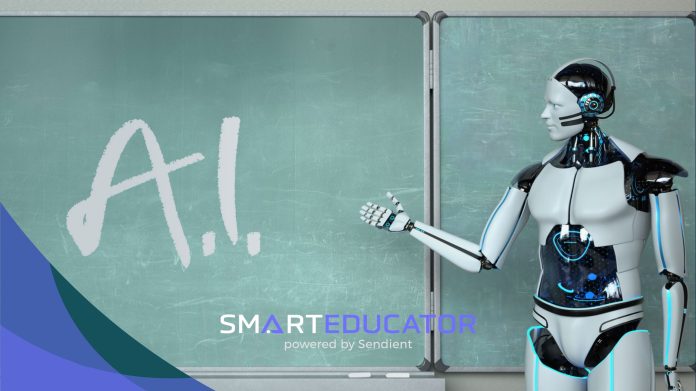Sendient Ltd navigates the future of AI in schools, explaining how this is transforming challenges into opportunities
The transformative potential of artificial intelligence (AI) in schools is undeniable. From personalised learning to streamlined administration, AI promises to reshape the educational landscape in the UK and beyond. However, with such potential comes a host of challenges that demand attention from policymakers, educators, and innovators alike.
AI is already deeply embedded in the lives of our young people. Tech giants such as Meta, Apple, and Snapchat are integrating AI into everyday devices and platforms, making these tools a natural part of how children engage with technology. This pervasive usage gives students a distinct edge over traditional teaching methods, highlighting the urgency of addressing AI in education. The opportunity to act is not optional or distant—it is essential and immediate.
The question is not whether AI will redefine education, but how we can ensure it is implemented responsibly to benefit all stakeholders.
The current state of AI in UK schools
AI has steadily made inroads into education for years, with tools like adaptive learning platforms and automated grading systems becoming more commonplace. The advent of generative AI – tools like ChatGPT – has propelled the technology to the forefront of public discourse. However, widespread adoption remains limited. According to research from Carnegie Learning, 77% of educators acknowledge AI’s usefulness, yet only 56% actively use it in their schools.
This gap reflects the optimism surrounding AI’s potential and the caution arising from unresolved challenges, such as data privacy and the need for comprehensive teacher training.
Why AI is unstoppable in education
The UK Government’s 2023 report on AI in education (3) highlights the transformative role of this technology. From improving teacher retention to enhancing student accessibility and outcomes, AI is undeniably reshaping the classroom. However, mixed reactions remain. While some educators embrace AI’s potential, others express concerns about its ethical implications, including fairness and the risk of over-reliance.
Opportunities presented by AI in schools
Personalised learning
AI-powered platforms can tailor lessons to meet the unique needs of each student. For those with special educational needs (SEN), this adaptability ensures a more inclusive learning environment. By catering to diverse learning styles, AI tools can enhance student engagement and comprehension.
Efficiency for educators
Administrative tasks such as grading, lesson planning, and report generation are time-consuming for teachers. AI automates these processes, enabling educators to devote more energy to classroom interaction and creative teaching. Studies indicate that 42% of teachers using AI report reduced workloads, freeing them for more impactful teaching activities.
Enhanced student outcomes
By providing tailored feedback and adaptive learning resources, AI empowers students to tackle complex topics, fostering deeper understanding and improved academic performance.
Challenges to address
The rise of AI in schools is not without its complications. Key concerns include:
- Data privacy and security:
- Adhering to GDPR regulations is critical to protect sensitive student data and maintain trust.
- Bias and fairness:
- AI systems require diverse datasets to prevent biases in grading or teaching materials. Without careful oversight, these tools risk perpetuating inequalities.
- Teacher training:
- According to Microsoft’s AI in Education report, 50% of educators cite a lack of training as the primary barrier to integrating AI into classrooms.
- Ethical concerns:
- Issues such as AI-facilitated plagiarism and over-reliance on automated tools challenge traditional approaches to education.
Building a framework for responsible AI in schools
To harness the full potential of AI while safeguarding against its risks, the following strategies must be prioritised:
Comprehensive policy frameworks
The anticipated UK equivalent of the EU AI Act will likely classify educational AI systems as high-risk. EdTech leaders like SmartEducator are already engaging with regulators to ensure their solutions meet these stringent requirements.
Transparency and accountability
Teachers, students, and parents must understand how AI systems work. Clear dashboards, detailed user guides, and regular audits can build trust and demystify AI processes.
Teacher support and training
Continuous Professional Development (CPD) programmes are essential to equip educators with the skills to use AI effectively. Training should address both technical applications and ethical considerations.
Inclusivity and accessibility
AI tools must prioritise inclusivity, ensuring all students, including those with SEN, benefit equally. Designing systems that accommodate diverse learners will amplify AI’s positive impact.
Bias mitigation
Fairness-aware algorithms and third- party audits are critical to ensuring equitable outcomes for all students, regardless of background or ability.
SmartEducator: A case study in innovation
SmartEducator exemplifies the responsible integration of AI in education. Through partnerships with the Department for Education and TechUK, SmartEducator addresses critical issues such as ethical AI design, data governance, and teacher training. Their commitment to transparency and inclusivity sets a benchmark for the EdTech sector, ensuring AI is used to enhance learning without compromising fairness or security.
Shaping the future of AI in schools responsibly
The integration of AI into UK schools is both inevitable and essential. Its potential to transform teaching, improve student outcomes, and reduce teacher workloads is unparalleled. Yet, the challenges it presents – ranging from ethical concerns to practical barriers – must not be overlooked.
By developing robust governance frameworks, supporting educators, and prioritising equity and transparency, we can ensure AI becomes a force for good in education. The future of learning lies at the intersection of human ingenuity and technological innovation. If implemented thoughtfully, AI will not only enhance education but also reaffirm its core purpose: empowering individuals to reach their full potential.
This article is brought to you by SmartEducator, a trusted leader in ethical and innovative AI solutions for education.
References
- https://www.carnegielearning.com/blog/educator-survey-ai-tools/#:~:text=Though%20we%20anticipated%20some%20of,of%20them%20actually%20use%20it!&text=Interestingly%2C%20our%20data%20highlighted%20an,the%20adoption%20of%20AI%20tools
- https://www.carnegielearning.com/blog/making-the-most-of-chatgpt/
- https://www.gov.uk/government/publications/generative-artificial-intelligence-in-education/generative-artificial-intelligence-ai-in-education











